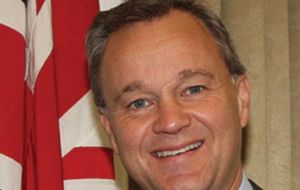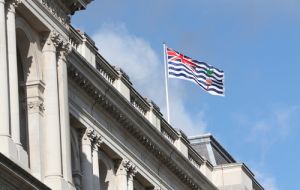MercoPress. South Atlantic News Agency
UK announces new feasibility study into resettlement of the British Indian Ocean Territory
 Minister Simmonds made the announcement to Parliament
Minister Simmonds made the announcement to Parliament  The flag and crest of BIOT, mainly concentrated in Diego Garcia Island which has a UK-US naval support facility
The flag and crest of BIOT, mainly concentrated in Diego Garcia Island which has a UK-US naval support facility The British government announced to Parliament that it will commission a new feasibility study into the resettlement of the British Indian Ocean Territory, BIOT, whose indigenous population the Chagossian was removed in the sixties and early seventies for defense reasons and is an issue that remains highly controversial and sensitive.
“I am therefore announcing to the House the Government’s intention to commission a new feasibility study into the resettlement of BIOT”, said Foreign Office Minister Mark Simmonds on Monday.
“Whilst we believe that there remain fundamental challenges to resettlement, we are resolved to explore these in partnership with all those with an interest in the future of BIOT. We are determined that this review will be as fair, transparent and inclusive as possible, so that all the facts and factors affecting the issue of resettlement can be shared and assessed clearly”.
Minister Symmonds said that as part of the process, officials are meeting with a wide range of interested parties, including Chagossian communities in Mauritius, the UK and in the Seychelles.
The results of these consultations will inform directly the detailed shape of the new study and though this will be a study commissioned by the Government, “we will ensure that independent views from all interested parties will be used when considering how we take the study forward. Our intention is to make the remit of the study of resettlement as broad as possible, so that all the relevant issues - practical, financial, legal, environmental, and defense matters - are given full and proper consideration”.
Minister Symmonds told the House that “this Government has expressed its regret about the way resettlement of BIOT was carried out in the late 1960s and early 1970s. We do not seek to justify those actions or excuse the conduct of an earlier generation. What happened was clearly wrong, which is why substantial compensation was rightly paid. Both the British courts and the European Court of Human Rights have confirmed that compensation has been paid in full and final settlement”.
However decisions about the future of the BIOT Ocean Territory are more difficult and the British government must be honest about the challenges and concerns since long-term settlement risks being both precarious and costly.
“The outer islands, which have been uninhabited for 40 years, are low-lying and lack all basic facilities and infrastructure. The cost and practicalities of providing the levels of infrastructure and public services appropriate for a twenty-first century British society are likely to be significant and present a heavy ongoing contingent liability for the UK tax-payer”.
However, “the Government recognizes the strength of feeling on this issue, and the fact that others believe that the resettlement of BIOT can be done more easily than we have previously assessed. We believe that our policy should be determined by the possibilities of what is practicable”.
Formerly administered as part of the British Crown Colony of Mauritius, the British Indian Ocean Territory (BIOT) was established as an overseas territory of the UK in 1965. A number of the islands of the territory were later transferred to the Seychelles when it attained independence in 1976. Subsequently, BIOT has consisted only of the six main island groups comprising the Chagos Archipelago.
The largest and most southerly of the islands, Diego Garcia, contains a joint UK-US naval support facility. All of the remaining islands are uninhabited. Between 1967 and 1973, former agricultural workers, earlier residents in the islands, were relocated primarily to Mauritius, but also to the Seychelles. Negotiations between 1971 and 1982 resulted in the establishment of a trust fund by the British Government as compensation for the displaced islanders, known as Chagossians.
Beginning in 1998, the islanders pursued a series of lawsuits against the British Government seeking further compensation and the right to return to the territory. In 2006 and 2007, British court rulings invalidated the immigration policies contained in the 2004 BIOT Constitution Order that had excluded the islanders from the archipelago, but upheld the special military status of Diego Garcia. In 2008, the House of Lords, as the final court of appeal in the UK, ruled in favour of the British Government by overturning the lower court rulings and finding no right of return for the Chagossians. (CIA publication).-




Top Comments
Disclaimer & comment rules-

-

-

Read all commentsIndigenous my arse....! Just give them the an Island and a six pack of Evian and lets be done with this sorry saga.
Jul 09th, 2013 - 07:19 am 0It is nice to see the Uk Government challenging the rhetoric of certain elements with axes to grind. Their is a recognition that the removal may not have been done correctly , however it is unrealistic of a group of people indigenous or other wise to expect to be bank rolled indefinitely as the surveys suggested at the time. They were adequately compensated at the time to limit liability as all subsequent court cases have borne out . However if it is possible for the population to return and be self sufficient with a limited cost that is also the right thing to do lack of fresh water is a very difficult issues to over come for a poor community. The main issue is it possible for the population to gain a livening without being dependent on the Base, again it is worth looking at to show what ever the rights and wrongs of the past the right thing is been done now and if this is as I suspect just another way to extort some more cash the gravy train once and for all should be permanently derailed.
Jul 09th, 2013 - 07:28 am 0No they werent the money went to the mauritian goverment and disappeared it was a shabby episode which shames the uk. putting it right is the right thing to do.
Jul 09th, 2013 - 08:52 am 0As we spend millions defending the falklands spending a couple of million giving chaoggisans the islands back is small change and the US military can foot the bill
Commenting for this story is now closed.
If you have a Facebook account, become a fan and comment on our Facebook Page!